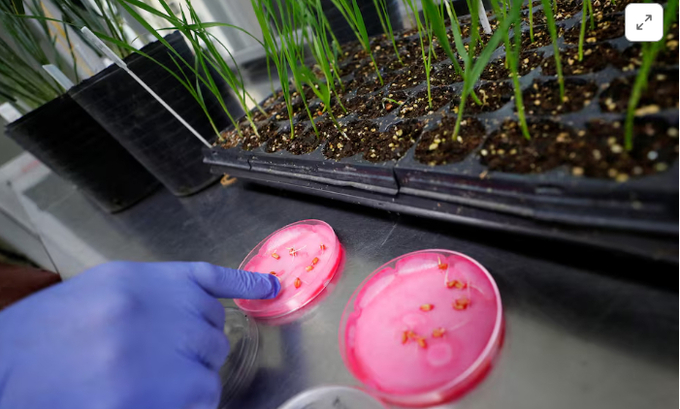December 18, 2025 | 06:48 GMT +7
December 18, 2025 | 06:48 GMT +7
Hotline: 0913.378.918
December 18, 2025 | 06:48 GMT +7
Hotline: 0913.378.918

Agricultural engineer Maximiliano Marzetti points to wheat seeds genetically modified with a strain called HB4, which has a gene that helps it better tolerate drought, inside a laboratory at Bioceres Crop Solutions in Rosario, Argentina July 19, 2022.
The determination clears the U.S. market for production of HB4 wheat, which is modified to tolerate drought, Bioceres said on Wednesday. It is a potential win for farmers grappling with drought and more severe weather, but risks pushback from some consumers and importers.
The United States, the world's fourth-largest wheat producer, is the fourth country to allow production of HB4 wheat, following Argentina, Brazil and Paraguay, Bioceres said.
Still, it will take years for Bioceres to complete additional steps, such as field trials, before HB4 wheat is grown commercially in the U.S., industry group U.S. Wheat Associates said.
"Wherever wheat is grown in the world, drought takes its toll on yields and quality, so an innovation like HB4 holds a lot of interest for growers like me," said Michael Peters, an Oklahoma wheat farmer and past chairman of U.S. Wheat Associates.
Genetic modification involves altering a plant's makeup by transferring DNA from one organism to another, and is common in crops such as corn, used for livestock feed. Some consumer groups oppose genetic modification of wheat over concerns about human health, since it is widely used to make bread and pasta, and therefore consumed directly by people.
USDA's decision on HB4 wheat is farther than the agency has ever gone with genetically modified wheat, U.S. Wheat Associates said.
Bioceres has said opposition to genetically modified wheat is easing due to soaring food prices and because GM crops can survive drought and pests, reducing the risk of famine.
In May, the company said it started sales of genetically modified wheat seeds in Argentina, the first time the technology became commercially available to farmers anywhere in the world.
The U.S. Food and Drug Administration concluded a review of Bioceres' wheat in 2022 without further questions. The FDA oversees the safety of food from new genetically modified crops before they enter the market, while the USDA reviews the impact on agriculture and the environment.
Australia, New Zealand, South Africa, Nigeria, Thailand, Indonesia, Colombia and Chile have approved HB4 wheat for food and feed use, according to Bioceres. The company said it received a license to perform field trials in Australia for an eventual production application.
Top buyers of U.S. wheat, including Mexico, the Philippines and Japan, have not approved it.
Japan must closely monitor the situation and would need to approve genetically modified wheat for distribution, said Kenji Okuhira, a director of the trade and operation division at Japan's Ministry of Agriculture, Forestry and Fisheries (MAFF).
"Even with approval, whether Japan would buy it or not would depend on actual demand from millers, or ultimately consumers," Okuhira said.
Two decades ago, Monsanto Co was working to commercialize wheat bred to withstand treatments of its weed-killer Roundup, but the company halted that effort in 2004. International buyers had threatened to boycott U.S. wheat if the product was introduced to the marketplace. Bayer AG (BAYGn.DE), opens new tab purchased Monsanto in 2018.
Some grain traders worried about the risk for genetically modified wheat to mix with non-GM wheat in bulk shipments.
"The GMO issue has declined into a sort of quiet stalemate in recent years," a German trader said. "But the refusal to accept GMOs in many importing regions, especially Europe and Asia, has not weakened."
(RT)

(VAN) 2025 AQUASTAT Water Data indicates that pressure on freshwater resources is growing as demand increases in regions of scarcity.

(VAN) Planet-warming pollution rates exploded after the end of World War II. James Watt’s steam engine launched the Industrial Revolution in 1769.

(VAN) The British Department for Environment, Food & Rural Affairs (Defra) has amended and extended a derogation for organic poultry and pigs, which currently allows up to 5% non-organic protein in feed.

(VAN) The Ah Louis Store in San Luis Obispo, California, turns into a winter wonderland every holiday season.

(VAN) Japanese feed millers are increasingly incorporating corn into their rations, in response to sustained high rice prices, according to a recent Grain and Feed Update from the Foreign Agricultural Service (FAS) of USDA.

(VAN) The event calls for urgent action to preserve glaciers, and recognises Mountain Future Award-winning projects in Colombia, Kyrgyzstan and Pakistan that protect mountain ecosystems and build resilience.

(VAN) New evidence shows that the health impacts of the Industrial Revolution varied more widely than previously believed, challenging the longstanding narrative that rural communities remained comparatively untouched.